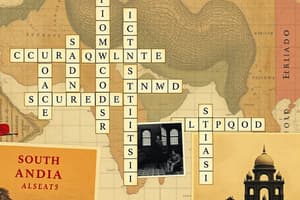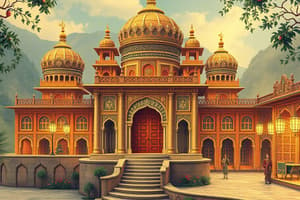Podcast
Questions and Answers
Which South Asian country recently held its 11th general election, considered free and fair?
Which South Asian country recently held its 11th general election, considered free and fair?
Bangladesh
In which South Asian country does the military continue to play a significant role in politics?
In which South Asian country does the military continue to play a significant role in politics?
Pakistan
What type of government does Bhutan have in the contemporary context?
What type of government does Bhutan have in the contemporary context?
Democratic-constitutional monarchy
Which South Asian country was the first to achieve an electoral democracy?
Which South Asian country was the first to achieve an electoral democracy?
What was the outcome of the 1971 Bangladesh Liberation War?
What was the outcome of the 1971 Bangladesh Liberation War?
Which country has a long-standing dispute over the territory of Kashmir?
Which country has a long-standing dispute over the territory of Kashmir?
What is a prime example of religious and ethnic tensions in the region?
What is a prime example of religious and ethnic tensions in the region?
Which country in South Asia has been struggling with economic slowdown and a trade deficit?
Which country in South Asia has been struggling with economic slowdown and a trade deficit?
Name a major religion in South Asia.
Name a major religion in South Asia.
What has led to a decline in religious tolerance and cultural diversity in South Asia?
What has led to a decline in religious tolerance and cultural diversity in South Asia?
Flashcards are hidden until you start studying
Study Notes
Contemporary South Asia: Politics, Conflicts, Economy, Demographics, and Culture
South Asia, a region that includes Bangladesh, Bhutan, India, Nepal, Maldives, Pakistan, and Sri Lanka, has experienced significant changes and challenges in recent years. This article provides a comprehensive overview of the current state of affairs in the region, focusing on the subtopics of politics, conflicts, economy, demographics, and culture.
Politics
In the contemporary context, South Asian politics is characterized by a mix of democratic and authoritarian regimes. India, Nepal, and Maldives are democratic nations, while Pakistan and Bhutan are democratic-constitutional monarchies. Bangladesh is a unique case, as it was the first country to achieve an electoral democracy. For instance, Bangladesh recently held its 11th general election, which was considered free and fair.
However, politics in the region is not without its challenges. For example, political instability in Nepal has been a concern in recent years, with the nation experiencing multiple elections, political parties, and factions. In Pakistan, the military continues to play a significant role in politics, with the country experiencing a military coup in 1999. Overall, politics in South Asia is a complex and ever-evolving landscape.
Conflicts
Conflicts have been a common feature of South Asian politics. The region has experienced numerous wars, including the 1971 Bangladesh Liberation War, which led to the creation of Bangladesh. The region has also been plagued by internal conflicts, such as the Sri Lankan Civil War, which lasted from 1983 to 2009. Additionally, India and Pakistan have a long-standing dispute over the territory of Kashmir.
Moreover, religious and ethnic tensions continue to simmer in the region, with periodic flare-ups leading to violence and displacement. The Rohingya crisis in Myanmar is a prime example of such tensions, with the ethnic Muslim minority facing persecution and displacement.
Economy
South Asia's economy is diverse and dynamic, with a range of industries, including agriculture, manufacturing, and services. The region is home to some of the world's fastest-growing economies, such as India and Bangladesh. However, the region also faces significant economic challenges, including income inequality, unemployment, and poverty.
For instance, India's economic growth has been slowing down in recent years, with the country facing a range of challenges, including a slowdown in manufacturing and services, and a decline in exports. Similarly, Nepal has been struggling with economic slowdown and a trade deficit.
Demographics
South Asia is a demographically diverse region, with a mix of ethnic, linguistic, and religious groups. The region is home to some of the world's largest populations, including India, Pakistan, and Bangladesh. However, the region also faces significant demographic challenges, including high population growth rates, urbanization, and migration.
For instance, India is the second-most populous country in the world, with a population of over 1.3 billion. The country has been grappling with issues such as overpopulation, poverty, and unemployment. Similarly, Pakistan faces a range of demographic challenges, including high population growth rates, with over 200 million people, and significant urbanization.
Culture
South Asian culture is a rich tapestry of diverse traditions, languages, and religions. The region is home to several major religions, including Hinduism, Buddhism, Islam, and Christianity. Additionally, South Asian culture is characterized by a range of customs, festivals, and traditions, such as the Diwali festival in India, the Holi festival in Nepal, and the Eid festival in Pakistan.
However, culture in the region is also subject to challenges and changes. For instance, the rise of fundamentalist and extremist groups in the region has led to a decline in religious tolerance and cultural diversity. Additionally, the region faces the challenge of preserving its cultural heritage in the face of globalization and modernization.
In conclusion, contemporary South Asia is a complex and dynamic region, characterized by a mix of political, economic, demographic, and cultural challenges and opportunities. While the region has made significant strides in areas such as economic growth and democratic governance, it continues to face significant challenges, including conflicts, inequality, and demographic pressures. As the region navigates these challenges, it remains to be seen how it will shape the future of South Asia.
Studying That Suits You
Use AI to generate personalized quizzes and flashcards to suit your learning preferences.




